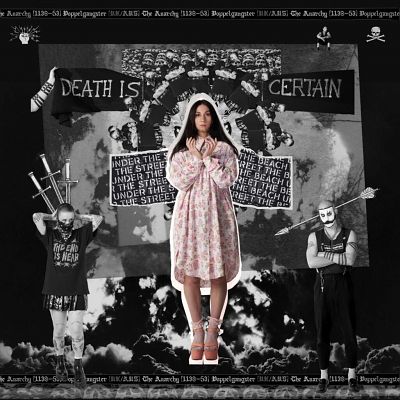
The Anarchy (1138-53)
Click here if you liked this article 7 ![]()
https://www.theatreworks.org.au/2025/the-anarchy-1138-53
Date Reviewed: 05/09/2025
And sing all the hard times of Old England,
In Old England, very hard times
The civil war in England and Normandy from 1138 to 1153 was a period of confusion, desperation, destruction and relentless hardship. Order had broken down, chaos reigned, and the people suffered enormously. It became known as The Anarchy, and Doppelgangster – the creative collective behind this performance – set out to give me just a taste of that world as they see it.
A particular childhood memory was reawakened tonight. I am on the Ghost Train ride at Luna Park – coincidentally, just down the road from Theatre Works – in the late 1970s. It’s dark, unpredictable, and moving dangerously fast. It’s often delightfully funny, sometimes frightening, and it offers no respite. It’s unrelenting. My heart is thumping and I want to go again.
The Anarchy (1138-53) is no historical drama. This is no slice-of-life portrayal. This is no gentle narrative of a time lost to history. This is an unyielding assault on your cognitive capacities, sometimes a deprivation of your senses and, well, a hell of a ride.
From the outset, as audience members, we are intentionally disoriented. Has the show even begun? Why are we in the dark? Am I supposed to be able to follow what this fellow is saying? How long can I endure this apparent bedlam?
We begin with rapid-fire exposition, impossible to follow. A host of characters and personalities are introduced, too many to grasp, and we scramble to discern where we are and what demands our focus. I am lost, but I don’t really mind.
We discover, eventually, that we are experiencing life during The Anarchy but in the form of a hopelessly complex adventure video game walk-through incorporating all the tropes of the genre. Cut scenes, fight scenes (!), treasure, magical items, secrets and the ever-present threat of a horrible death. We piece this together as our brains try, frantically, to make sense of the torrent of verbiage hurled at us by our performers.
And our performers are quite something. Tobias Manderson-Galvin’s energy, voice and physical presence drive the show inexorably forward. He is simultaneously our primary narrator, our comical guide, but also our tormentor. Kerith Manderson-Galvin begins as a wraith cloaked in darkness before emerging as another powerhouse of energy and anguish with flashes of comedy when least expected. Together, their punk/goth aesthetic keeps us just slightly off-balance and at a distance. Their smiles and their songs draw us in.
The two together seem to genuinely love being there and being with us. They relish their interactions with the audience, and they understand what they are exacting from us. They acknowledge it explicitly and, somehow, it comforts us to know that they empathise with our discomfort. We feel validated but we are still not completely safe.
This urgent piece of theatre is demanding but deeply rewarding if you give it your full attention and embrace its ambiguity and disorder. At over two-hours long without an interval, this show is not going to be for everyone. But it sure was for me, and it might just be for you too. Enjoy the ride.
Reviewed by Daniel Kinal